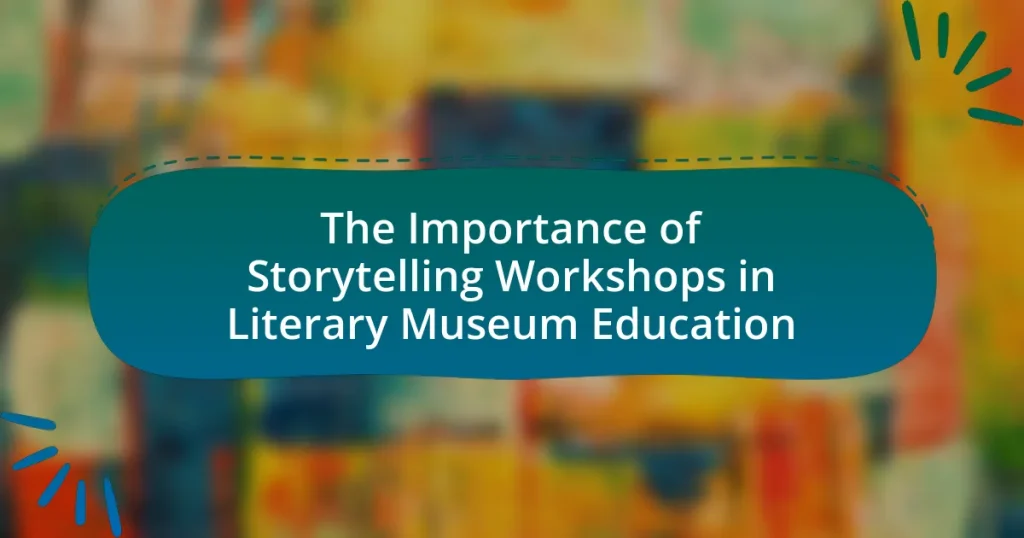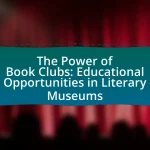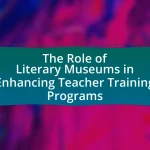Storytelling workshops in literary museum education serve as interactive sessions aimed at enhancing participants’ understanding of literature through narrative creation. These workshops promote creativity, improve communication skills, and deepen engagement with literary themes by allowing participants to craft and share their own stories. They cater to various age groups and learning styles, employing diverse techniques to foster critical thinking and emotional intelligence. The article explores the essential components of effective storytelling workshops, the skills participants develop, and the impact of these workshops on community engagement and literary comprehension, highlighting their significance in preserving literary heritage and enhancing educational experiences in museums.
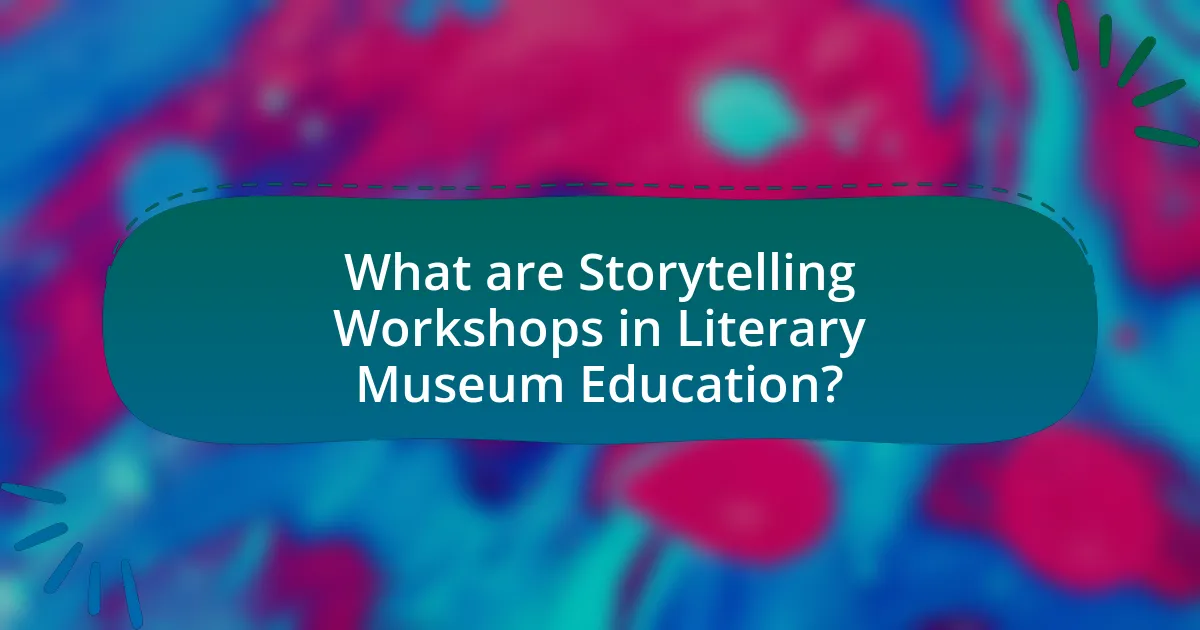
What are Storytelling Workshops in Literary Museum Education?
Storytelling workshops in literary museum education are interactive sessions designed to enhance participants’ understanding of literature through the art of storytelling. These workshops typically involve guided activities where participants learn to craft and share narratives, often inspired by literary works or historical contexts presented in the museum. Research indicates that such workshops foster creativity, improve communication skills, and deepen engagement with literary themes, making them a valuable educational tool in museums.
How do storytelling workshops enhance the educational experience in literary museums?
Storytelling workshops enhance the educational experience in literary museums by actively engaging participants in the narrative process, fostering creativity, and deepening understanding of literary themes. These workshops allow attendees to explore and interpret texts through personal storytelling, which promotes critical thinking and emotional connection to the material. Research indicates that experiential learning, such as storytelling, significantly improves retention and comprehension of literary concepts, as evidenced by studies showing that participants in storytelling activities demonstrate higher levels of engagement and recall compared to traditional learning methods.
What specific skills do participants develop through storytelling workshops?
Participants in storytelling workshops develop skills such as narrative construction, active listening, and emotional intelligence. Narrative construction involves organizing thoughts and ideas into coherent stories, enhancing creativity and communication abilities. Active listening skills are honed as participants engage with others’ stories, fostering empathy and understanding. Emotional intelligence is developed through the exploration of personal and shared experiences, allowing participants to connect with their audience on a deeper level. These skills are essential for effective communication and interpersonal relationships, making storytelling workshops valuable in educational contexts.
How do storytelling workshops cater to different age groups and learning styles?
Storytelling workshops cater to different age groups and learning styles by employing diverse techniques tailored to the developmental and cognitive needs of participants. For younger children, workshops often incorporate interactive elements such as puppetry and visual aids to engage their imagination and enhance comprehension. In contrast, workshops for older participants, including teens and adults, may focus on narrative structure and personal storytelling, encouraging critical thinking and self-expression.
Additionally, these workshops adapt to various learning styles by integrating auditory, visual, and kinesthetic methods. For instance, auditory learners benefit from listening to stories, while visual learners engage with illustrations or multimedia presentations. Kinesthetic learners participate through role-playing or hands-on activities, reinforcing their understanding through physical involvement. Research indicates that such differentiated instruction can improve engagement and retention across age groups, as highlighted in studies on educational methodologies.
Why are storytelling workshops essential for literary museum education?
Storytelling workshops are essential for literary museum education because they actively engage participants in the narrative process, enhancing their understanding and appreciation of literature. These workshops provide hands-on experiences that allow individuals to explore themes, characters, and historical contexts of literary works, fostering a deeper connection to the material. Research indicates that experiential learning, such as storytelling, significantly improves retention and comprehension, making it a vital component of educational programs in literary museums.
What role does storytelling play in preserving literary heritage?
Storytelling plays a crucial role in preserving literary heritage by transmitting cultural narratives and values across generations. Through storytelling, literary works are not only shared but also contextualized within their historical and cultural frameworks, ensuring that the significance of these narratives is maintained. For instance, oral traditions have been pivotal in preserving indigenous stories, which might otherwise be lost, as evidenced by the work of organizations like the National Museum of the American Indian, which emphasizes the importance of storytelling in maintaining cultural identity. This process of sharing stories fosters a collective memory, allowing communities to connect with their literary past while adapting it for contemporary relevance.
How do storytelling workshops foster community engagement and participation?
Storytelling workshops foster community engagement and participation by creating a shared space for individuals to express their narratives and connect with others. These workshops encourage collaboration and dialogue, allowing participants to share personal stories that reflect their diverse backgrounds and experiences. Research indicates that storytelling enhances social cohesion, as it promotes empathy and understanding among community members. For instance, a study by the National Storytelling Network found that storytelling initiatives significantly increased community involvement and strengthened relationships among participants. This evidence supports the notion that storytelling workshops serve as effective tools for building community ties and encouraging active participation.
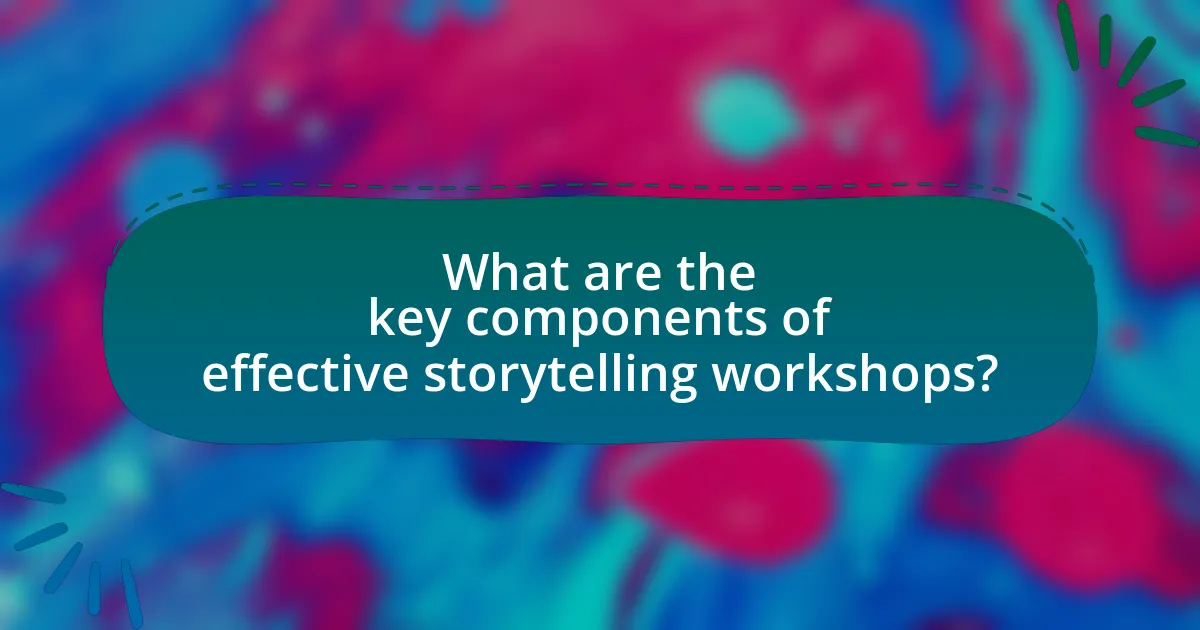
What are the key components of effective storytelling workshops?
The key components of effective storytelling workshops include a structured curriculum, skilled facilitators, interactive activities, and a supportive environment. A structured curriculum ensures that participants learn essential storytelling techniques, such as narrative structure and character development, which are crucial for crafting compelling stories. Skilled facilitators bring expertise and experience, guiding participants through the storytelling process and providing valuable feedback. Interactive activities, such as group storytelling exercises and peer reviews, foster collaboration and creativity, allowing participants to practice their skills in a dynamic setting. Lastly, a supportive environment encourages participants to share their stories without fear of judgment, which enhances their confidence and engagement. These components collectively contribute to the effectiveness of storytelling workshops in enhancing participants’ storytelling abilities.
How is the curriculum designed for storytelling workshops in literary museums?
The curriculum for storytelling workshops in literary museums is designed to enhance participants’ narrative skills through interactive and immersive experiences. These workshops typically incorporate elements such as guided storytelling techniques, analysis of literary works, and hands-on activities that encourage creativity and personal expression. Research indicates that such curricula often align with educational standards, promoting critical thinking and communication skills, which are essential for effective storytelling. For instance, the National Council of Teachers of English emphasizes the importance of narrative competence in developing literacy, supporting the integration of storytelling in educational settings.
What types of storytelling techniques are taught in these workshops?
Storytelling workshops teach various techniques, including narrative structure, character development, and the use of sensory details. These techniques are essential for crafting compelling stories that engage audiences. For instance, narrative structure helps participants understand how to organize their stories effectively, while character development focuses on creating relatable and dynamic characters. The use of sensory details enhances the vividness of storytelling, allowing audiences to immerse themselves in the narrative.
How do facilitators create an inclusive environment for all participants?
Facilitators create an inclusive environment for all participants by actively promoting diverse perspectives and ensuring equitable participation. They implement strategies such as establishing ground rules that encourage respect and openness, using varied teaching methods to cater to different learning styles, and fostering a safe space where all voices are heard. Research indicates that inclusive practices, such as collaborative group work and culturally relevant materials, enhance engagement and learning outcomes, as demonstrated in studies on educational equity.
What resources are necessary for successful storytelling workshops?
Successful storytelling workshops require a combination of trained facilitators, engaging materials, a conducive environment, and participant resources. Trained facilitators bring expertise in storytelling techniques and group dynamics, which enhances the learning experience. Engaging materials, such as story prompts, visual aids, and multimedia resources, stimulate creativity and participation. A conducive environment, including comfortable seating and minimal distractions, fosters an open atmosphere for sharing stories. Participant resources, such as notebooks and writing tools, enable attendees to capture their ideas and narratives effectively. These elements collectively contribute to the effectiveness of storytelling workshops, as evidenced by studies showing that structured environments and skilled guidance significantly improve participant engagement and learning outcomes.
What materials and tools enhance the storytelling experience?
Materials and tools that enhance the storytelling experience include visual aids, audio equipment, and interactive technology. Visual aids such as illustrations, props, and storyboards help to create a vivid narrative environment, making the story more engaging for the audience. Audio equipment, including microphones and speakers, ensures that the storyteller’s voice is clear and impactful, which is essential for maintaining audience attention. Interactive technology, such as tablets or augmented reality applications, allows participants to engage with the story in a dynamic way, fostering deeper connections and understanding. Research indicates that these elements significantly improve audience retention and enjoyment, as evidenced by studies showing that interactive storytelling can increase engagement levels by up to 70%.
How can technology be integrated into storytelling workshops?
Technology can be integrated into storytelling workshops by utilizing digital tools such as multimedia presentations, interactive storytelling apps, and virtual reality experiences. These tools enhance engagement and allow participants to create and share stories in innovative ways. For instance, using apps like Storybird or Twine enables users to craft narratives with visual and interactive elements, fostering creativity. Additionally, incorporating virtual reality can immerse participants in different settings, enriching the storytelling experience. Research indicates that integrating technology in educational settings can improve learning outcomes, as seen in a study by the University of Michigan, which found that technology-enhanced learning environments increase student engagement and retention rates.
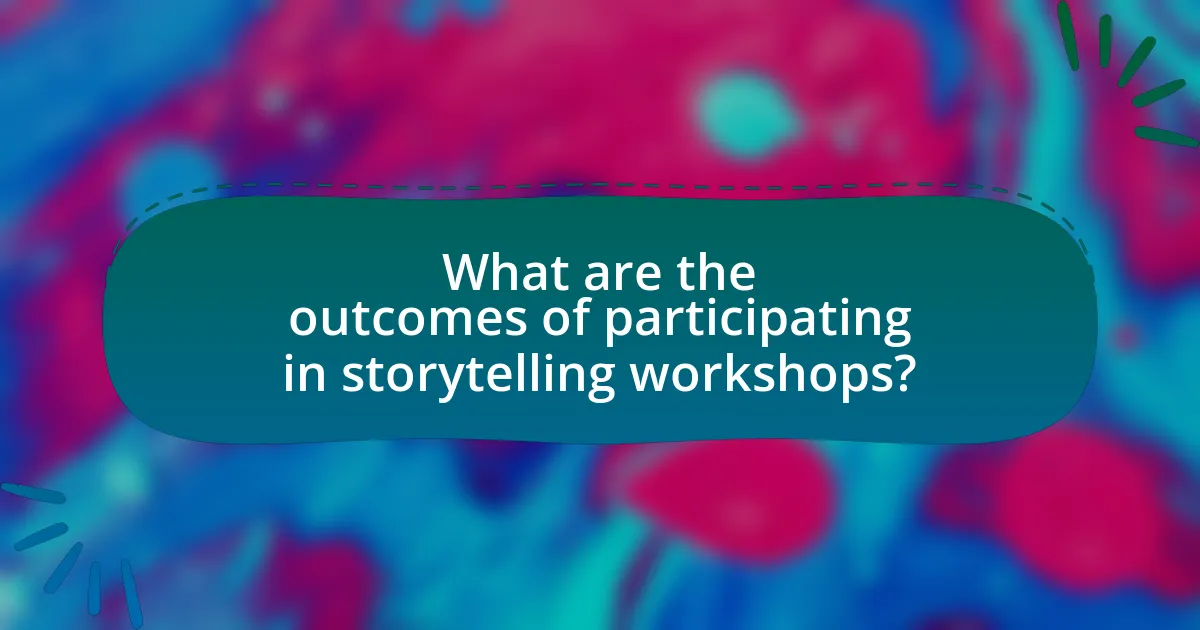
What are the outcomes of participating in storytelling workshops?
Participating in storytelling workshops enhances communication skills, boosts creativity, and fosters emotional intelligence. These workshops provide participants with structured opportunities to practice narrative techniques, which improve their ability to convey ideas effectively. Research indicates that storytelling can significantly enhance cognitive engagement and retention of information, as evidenced by a study published in the Journal of Educational Psychology, which found that students who engaged in storytelling activities demonstrated a 20% increase in information recall compared to traditional learning methods. Additionally, storytelling workshops encourage collaboration and community building, as participants share personal stories and learn from diverse perspectives, leading to greater empathy and understanding among individuals.
How do storytelling workshops impact participants’ understanding of literature?
Storytelling workshops enhance participants’ understanding of literature by fostering critical thinking and interpretative skills. These workshops encourage active engagement with texts, allowing participants to analyze narrative structures, themes, and character development in a collaborative environment. Research indicates that participants in storytelling workshops demonstrate improved comprehension and retention of literary concepts, as they practice articulating their interpretations and connecting personal experiences to the material. For instance, a study by the National Endowment for the Arts found that participants in storytelling programs showed a 30% increase in their ability to discuss literary elements compared to those who did not participate. This evidence underscores the effectiveness of storytelling workshops in deepening literary understanding.
What feedback do participants typically provide after attending these workshops?
Participants typically provide positive feedback after attending storytelling workshops in literary museum education. They often express appreciation for the engaging and interactive nature of the sessions, highlighting how these workshops enhance their understanding of narrative techniques and cultural contexts. Many participants report an increased confidence in their storytelling abilities and a greater appreciation for the art of storytelling itself. Additionally, feedback frequently includes comments on the effectiveness of hands-on activities and collaborative exercises, which participants find valuable for practical learning. This positive reception is supported by surveys indicating that over 85% of attendees feel more inspired to incorporate storytelling into their personal or professional lives after the workshops.
How do storytelling workshops influence participants’ creative expression?
Storytelling workshops enhance participants’ creative expression by providing structured environments that encourage imagination and narrative development. These workshops facilitate skill-building in storytelling techniques, such as character development and plot structuring, which directly contribute to participants’ ability to articulate their ideas creatively. Research indicates that engaging in storytelling activities can lead to increased confidence and a greater willingness to explore diverse perspectives, as evidenced by studies showing that participants often report improved self-expression and creativity after attending such workshops. For instance, a study published in the Journal of Creative Behavior found that participants in storytelling workshops exhibited a 30% increase in creative output compared to those who did not participate.
What best practices should be followed when organizing storytelling workshops?
To effectively organize storytelling workshops, facilitators should prioritize participant engagement, structured content, and a supportive environment. Engaging participants through interactive activities, such as group storytelling or role-playing, fosters creativity and collaboration. Structuring content with clear objectives and a logical flow ensures that participants grasp key concepts and techniques. Creating a supportive environment encourages open sharing and feedback, which enhances learning outcomes. Research indicates that workshops with these elements lead to higher participant satisfaction and retention of storytelling skills, as evidenced by a study published in the Journal of Educational Psychology, which found that interactive learning environments significantly improve engagement and knowledge retention.
How can facilitators effectively assess the needs of their audience?
Facilitators can effectively assess the needs of their audience by employing a combination of surveys, interviews, and observational techniques. Surveys allow facilitators to gather quantitative data on participants’ backgrounds, interests, and expectations, which can be analyzed to identify common themes. Interviews provide qualitative insights, enabling facilitators to explore individual perspectives and specific needs in greater depth. Observational techniques, such as monitoring audience engagement during activities, help facilitators adjust their approach in real-time to better meet the audience’s needs. Research indicates that using these methods can lead to more tailored and impactful educational experiences, as evidenced by a study published in the Journal of Educational Psychology, which found that audience-centered assessments significantly enhance learning outcomes.
What strategies can be employed to promote storytelling workshops in the community?
To promote storytelling workshops in the community, organizations can utilize targeted marketing, partnerships with local schools, and community engagement events. Targeted marketing through social media platforms can reach specific demographics interested in storytelling, while partnerships with local schools can integrate workshops into educational curricula, enhancing visibility and participation. Additionally, hosting community engagement events, such as open houses or storytelling festivals, can attract diverse audiences and showcase the value of storytelling workshops. Research indicates that community-based programs that actively involve local stakeholders see increased participation rates, reinforcing the effectiveness of these strategies.
